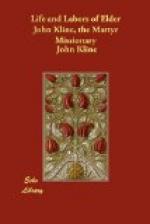We are now prepared to understand how Jesus could know the thoughts of men, and why he needed not that any should testify to him of man, for he knew what was in man. He knew all this by creation and preservation, by his power of perception which is boundless, and his knowledge which is infinite. Man’s body, when viewed intelligently, with its organs of life and motion, is a thing of wonder in our eyes. Anatomy reveals in its organs, designs and purposes in their structures and uses which overwhelm us with astonishment. What, then, must the soul be, when its structure and organization, essence and power as far exceed those of the body as the man who lives in the house exceeds the house? For the body is nothing more than the house or habitation of the soul. Paul calls it “our earthly house.” He says: “In this we groan—it will be dissolved.” He then immediately turns his thought to the renewed soul or spiritual body, and calls it “a building of God, a house not made with hands.” All things, then, pertaining to our souls, being naked and open to the eyes of him with whom we have to do, we may rest secure in the belief that whatever he tells us about ourselves is true. He knows just what we can do and what we cannot do. And it is he who says, “No man can come to me, except the Father draw him.”
But perhaps some inside this house are saying within themselves: “Is man not free to choose good or evil—to do right or wrong?” I answer that he is free,—free as the eagle in the air; free as the fox in the bramble; free as the lion in the desert; free as birds and beasts are free to comply with the instincts of their natures and the inclinations of their wills. Man’s freedom is what makes him a responsible being. He is yet more free than the brute creation; because that is bounded by the limits of capacity. But man’s mind is capable of indefinite expansion and elevation in knowledge. Still the text is true: “No man can come to me, except the Father draw him.” Let me draw a comparison here. A king once made a great supper and invited many to come and partake of it. At the right time he sent forth his servants to tell them that were bidden to come, for all things are now ready. Did they go? No! They all began to make excuses. You see they were free, free to go, and free to stay away. They chose to stay away, and in this very way every sinner uses his freedom; he chooses not to come to the Lord.




